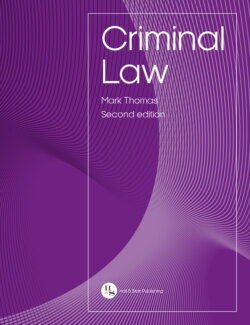Читать книгу Criminal Law - Mark Thomas - Страница 83
На сайте Литреса книга снята с продажи.
2.6.3.3Unreasonable failure to act
ОглавлениеThe third factor is that the defendant unreasonably failed to act on that duty. Should a defendant do what ordinary people would consider reasonable in the circumstances, he will not be liable for his failure to act. This question essentially asks whether the defendant breached his duty to act and whether that breach was unreasonable in the circumstances.
example
Jill is drowning in a lake. Jack reaches in to try to save her but cannot get to her. Jack is unable to swim himself, so he cannot jump in to save Jill. Instead Jack calls for assistance.
This scenario is a good example of how one should consider the question of reasonableness. In the circumstances where Jack is unable to swim, his failure to act (ie jumping into the water himself) would not be considered so unreasonable that he is liable for an offence. This is so on account that Jack is liable to do more harm than good if he himself cannot swim. In particular, there is a risk that Jack could exacerbate the circumstances for Jill and put himself in danger at the same time. His reasonable refusal is, further, strengthened by his reasonable act of calling for assistance. Had Jack not called for assistance, it is plausible that, overall, he might be considered as having acted unreasonably. Reasonableness is considered by the arbiters of fact.
It is important to emphasise that even if these three elements are satisfied, the prosecution must still prove that the defendant’s omission caused the end result and the defendant possessed the necessary mens rea. In that regard, if the end result would have occurred anyway (ie there was no factual causation), then the defendant cannot be liable (though some other offence may be available).
We shall now consider the established duties to act.
